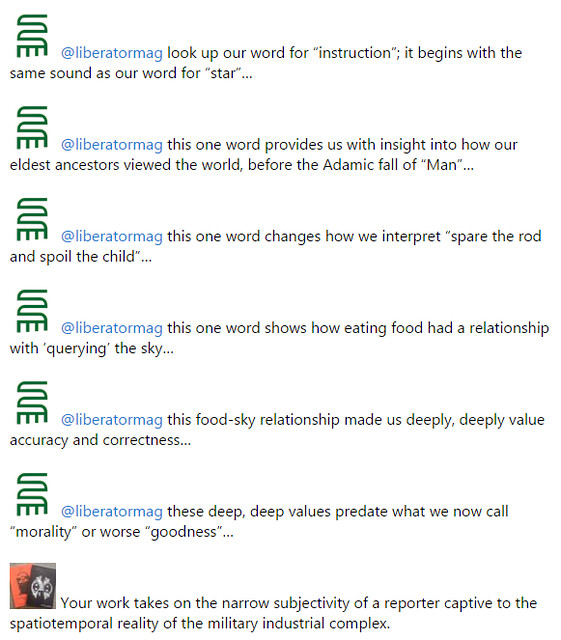A rare non-exchange un-between @liberatormag and @KinteSpace
Starting with Brian Kasoro and a few others that I am literally unable to name, Liberator Magazine has been one of the most consistent supporters of what I’ve been struggling with here in the kinté space. My relatively recent appearance on Twitter as @KinteSpace has been supported most enthusiastically by @liberatormag, making my Twitter experience pleasant.
But one day I went too far.
The @liberatormag Twitter account (I do not know exactly who is posting for @liberatormag at any given time) posted a link to an educational tool around a subject near and dear to my heart. So, you can see from my archive of the non-exchange, I began to send multiple messages about this educational subject to @liberatormag. These messages were not explicitly requested by @liberatormag. I just sent them—one after another.
When I first appeared on Twitter, I engaged in this behavior with at least two (supposedly female) Twitter accounts. These accounts blocked my account immediately, based in the context (evidently) that I “assaulted” them within some patriarchal/anti-patriarchal gender-political context. I learned very quickly to non-engage with such folk and since I have been alive for decades in the United States, without being put in handcuffs once, I can non-interact with people very, very well.
But I was too comfortable with @liberatormag.

What I am seeing from my curated ‘Tweeted Links’ is me tweeting directly to a Twitter account while said Twitter account does not refer to my account directly, yet appears to directing messages to it because of the coincidence of Twitter-timeline context. I then use @KinteSpace to state that I perceive what is going on and then I stop. I’m done with that exchange.
What is important for me to remember is how folks these days not speak to each other. People (and by “people” I mean adults) appear to be so “smart” or so “busy” that they don’t have the time to respectfully tell another person that their presence is not welcome. It seems (perhaps) to be based on the assumption that the person asserting themselves is supposed to know that they should not speak unless they are spoken to—which is something I thought only mothers told their children.
Or (perhaps) it is more like the boss that is too timid to fire people and they just “hope” they go away… Enough with the guessing!
You see, kids, “my world” on the Web starts with the CompuServe forum (which existed before the Web)—not the fucking nightclub. I have this old man’s habit of thinking that I can just talk to anyone in the world about any subject (in a debatably “appropriate” context) just because I am on the Internet. I think the Internet is an extension of a college campus and not the military technology that it formed its genesis.
I habitually and too often erroneously see the Internet as a tool for the free exchange of ideas. I am reminded continually that it’s more like a tool for hierarchical, monetized socialization—based on New York night-life traditions, replicated throughout the urbanizing world. (This petty clique shit is also happening in the hard-core tech world as well.)
The Internet never had people in it—and now it’s probably out of ideas as well…
The bigger picture: Tweeted Links are better than comments!
One of the things I learned very quickly in the hard-core tech wired world is that few folks are motivated to leave comments on your Blog unless they get the feeling people other than you will see their words. So, for the most part, you have people pretending to talk to you, talking around you for the sake of the larger “community.” Jeff Atwood’s StackOverflow.com addressed this situation head on and formalized this practice with positive effect.
What Twitter also provides, as a monetizing hierarchical socializing platform, is a centralized way to talk around people on a planetary scale. When the “Black Twitter” people are not talking to me, they often say the most interesting things (because when folks are talking to me these days it is mostly, “wha?” “huh?” and other North American hep-cat interjections). So, instead of complaining (more), I can sincerely demonstrate my respect for others (while they have no respect for me—okay, that was unfair of me) by ‘curating’ their Twitter tweets into Twitter-links or Tweeted Links.
I built a crappy Tweeted Links-building system (for myself) that utilizes Microsoft Azure in places. I use this system to turn tweets back into old-school Blog posts by dragging and dropping a stream-of-consciousness ‘collage’ of tweets into one big glob of HTML.
To me, Tweeted Links take a snapshot in time—an image of my composition—of the history of the social-media world. It became quite clear to me how important this work is (for me) when the Ferguson, Missouri murder scandal broke out.
Tweeted Links may also help to answer questions my adult children may have about why their father died sad and alone with his “dogmatic” ideas.
